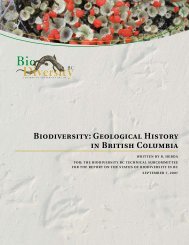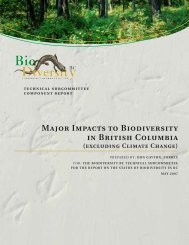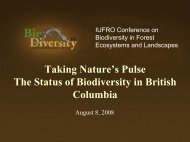- Page 1: Taking Nature’s Pulsethe status o
- Page 4 and 5: Library and Archives Canada Catalog
- Page 6 and 7: IVtaking nature’s pulse: the stat
- Page 8 and 9: VItaking nature’s pulse: the stat
- Page 10 and 11: VIIItaking nature’s pulse: the st
- Page 13: table of contentsIfigure 27. Forest
- Page 16: IVtaking nature’s pulse: the stat
- Page 19: executive summaryVIImajor finding:1
- Page 23 and 24: executive the status summary of bio
- Page 26 and 27: IVtaking nature’s pulse: the stat
- Page 28 and 29: VItaking nature’s pulse: the stat
- Page 30 and 31: VIIItaking nature’s pulse: the st
- Page 32 and 33: taking nature’s pulse: the status
- Page 34 and 35: t130°W 120°W110°W60°NY u k o nN
- Page 37 and 38: 1 a primer on Biodiversity: Its Imp
- Page 39 and 40: a primer on biodiversityIan McAllis
- Page 41 and 42: a primer on biodiversityComposition
- Page 43 and 44: a primer on biodiversitytext box 1.
- Page 45 and 46: a primer on biodiversitytext box 2.
- Page 47: a primer on biodiversity1 . 3 . 2 i
- Page 50 and 51: taking nature’s pulse: the status
- Page 52 and 53: taking nature’s pulse: the status
- Page 54 and 55: taking nature’s pulse: the status
- Page 56 and 57: taking nature’s pulse: the status
- Page 58 and 59: taking nature’s pulse: the status
- Page 60 and 61: t130°W 120°W110°W60°NY u k o nN
- Page 62 and 63: taking nature’s pulse: the status
- Page 64 and 65: taking nature’s pulse: the status
- Page 66 and 67: taking nature’s pulse: the status
- Page 68 and 69: t130°W 120°W110°W60°NY u k o nN
- Page 70 and 71:
taking nature’s pulse: the status
- Page 72 and 73:
taking nature’s pulse: the status
- Page 74 and 75:
taking nature’s pulse: the status
- Page 76 and 77:
t130°W 120°W110°W60°NY u k o nN
- Page 78 and 79:
taking nature’s pulse: the status
- Page 80 and 81:
taking nature’s pulse: the status
- Page 82 and 83:
taking nature’s pulse: the status
- Page 84 and 85:
t130°W 120°W110°W60°NY u k o nN
- Page 86 and 87:
taking nature’s pulse: the status
- Page 88 and 89:
t130°W 120°W110°W60°NY u k o nN
- Page 90 and 91:
taking nature’s pulse: the status
- Page 92 and 93:
taking nature’s pulse: the status
- Page 94 and 95:
taking nature’s pulse: the status
- Page 96 and 97:
taking nature’s pulse: the status
- Page 98 and 99:
taking nature’s pulse: the status
- Page 100 and 101:
taking nature’s pulse: the status
- Page 102 and 103:
taking nature’s pulse: the status
- Page 104 and 105:
taking nature’s pulse: the status
- Page 106 and 107:
taking nature’s pulse: the status
- Page 108 and 109:
taking nature’s pulse: the status
- Page 110 and 111:
taking nature’s pulse: the status
- Page 112 and 113:
taking nature’s pulse: the status
- Page 114 and 115:
taking nature’s pulse: the status
- Page 116 and 117:
taking nature’s pulse: the status
- Page 118 and 119:
taking nature’s pulse: the status
- Page 120 and 121:
taking nature’s pulse: the status
- Page 122 and 123:
taking nature’s pulse: the status
- Page 124 and 125:
taking nature’s pulse: the status
- Page 126 and 127:
taking nature’s pulse: the status
- Page 128 and 129:
taking nature’s pulse: the status
- Page 130 and 131:
taking nature’s pulse: the status
- Page 132 and 133:
taking nature’s pulse: the status
- Page 134 and 135:
taking nature’s pulse: the status
- Page 136 and 137:
taking nature’s pulse: the status
- Page 138 and 139:
t130°W 120°W110°W60°NY u k o nN
- Page 140 and 141:
taking nature’s pulse: the status
- Page 142 and 143:
taking nature’s pulse: the status
- Page 144 and 145:
taking nature’s pulse: the status
- Page 146 and 147:
taking nature’s pulse: the status
- Page 148 and 149:
taking nature’s pulse: the status
- Page 150 and 151:
taking nature’s pulse: the status
- Page 152 and 153:
taking nature’s pulse: the status
- Page 154 and 155:
taking nature’s pulse: the status
- Page 156 and 157:
taking nature’s pulse: the status
- Page 158 and 159:
taking nature’s pulse: the status
- Page 160 and 161:
taking nature’s pulse: the status
- Page 162 and 163:
taking nature’s pulse: the status
- Page 164 and 165:
taking nature’s pulse: the status
- Page 166 and 167:
taking nature’s pulse: the status
- Page 168 and 169:
taking nature’s pulse: the status
- Page 170 and 171:
t130°W 120°W110°W60°NY u k o nN
- Page 172 and 173:
taking nature’s pulse: the status
- Page 174 and 175:
t130°W 120°W110°W60°NY u k o nN
- Page 176 and 177:
taking nature’s pulse: the status
- Page 178 and 179:
taking nature’s pulse: the status
- Page 180 and 181:
taking nature’s pulse: the status
- Page 182 and 183:
taking nature’s pulse: the status
- Page 184 and 185:
taking nature’s pulse: the status
- Page 186 and 187:
taking nature’s pulse: the status
- Page 188 and 189:
taking nature’s pulse: the status
- Page 190 and 191:
taking nature’s pulse: the status
- Page 192 and 193:
taking nature’s pulse: the status
- Page 194 and 195:
taking nature’s pulse: the status
- Page 196 and 197:
taking nature’s pulse: the status
- Page 198 and 199:
taking nature’s pulse: the status
- Page 200 and 201:
taking nature’s pulse: the status
- Page 202 and 203:
taking nature’s pulse: the status
- Page 204 and 205:
taking nature’s pulse: the status
- Page 206 and 207:
taking nature’s pulse: the status
- Page 208 and 209:
taking nature’s pulse: the status
- Page 210 and 211:
taking nature’s pulse: the status
- Page 212 and 213:
Y u k o nN o r t h w e s tT e r r i
- Page 214 and 215:
130°W 120°W110°W60°NY u k o nN
- Page 216 and 217:
taking nature’s pulse: the status
- Page 218 and 219:
taking nature’s pulse: the status
- Page 220 and 221:
taking nature’s pulse: the status
- Page 222 and 223:
taking nature’s pulse: the status
- Page 224 and 225:
taking nature’s pulse: the status
- Page 226 and 227:
taking nature’s pulse: the status
- Page 228 and 229:
taking nature’s pulse: the status
- Page 230 and 231:
taking nature’s pulse: the status
- Page 232 and 233:
taking nature’s pulse: the status
- Page 234 and 235:
t130°W 120°W110°W60°NY u k o nN
- Page 236 and 237:
taking nature’s pulse: the status
- Page 238 and 239:
t130°W 120°W110°WM A P 2 160°NY
- Page 240 and 241:
t130°W 120°W110°WM A P 2 260°NY
- Page 242 and 243:
taking nature’s pulse: the status
- Page 245 and 246:
4 Major Findings4.1 IntroductionBio
- Page 247 and 248:
major findings4.3 The Major Finding
- Page 249 and 250:
major findings6. Significant areas
- Page 251 and 252:
Forests are the dominant land cover
- Page 253 and 254:
major findingsassociated with motor
- Page 255 and 256:
major findings19. Climate change is
- Page 257 and 258:
glossaryGlossaryAbiotic: non-living
- Page 259 and 260:
glossaryEcosystem: is a dynamic com
- Page 261 and 262:
glossaryMycorrhizae: mutually benef
- Page 263 and 264:
appendicesAppendix A.historic speci
- Page 265 and 266:
appendicesappendix b. continuedTAXa
- Page 267 and 268:
appendicesappendix b. continuedTAXa
- Page 269 and 270:
notes35 Hunn, E.S., N.J. Turner and
- Page 271 and 272:
notes114 See endnote 106.115 See en
- Page 273 and 274:
notes195 See endnote 87.196 Warman,
- Page 275 and 276:
notes273 Guppy, C.S. and J.H. Shepa
- Page 277 and 278:
notes345 Andren H. 1994. Effects of
- Page 279 and 280:
notes415 Hobbs, N.T. 1996. Modifica
- Page 281 and 282:
notes487 Gerlach, J.P., P.B. Reich,
- Page 283 and 284:
notes555 See endnote 546.556 See en
- Page 285 and 286:
notes621 Irvine, J.R. 2002. COSEWIC
- Page 287 and 288:
notes690 See endnote 687.691 See en
- Page 289 and 290:
notes766 See endnote 284.767 See en
- Page 291 and 292:
notesDepartment of Fisheries and Oc
- Page 293 and 294:
notes935 See endnote 931.936 See en
- Page 295 and 296:
notesAssessment Network, Burlington
- Page 297 and 298:
indexnatural disturbance 90, 102-4,
- Page 299 and 300:
species indexgull (Larus spp.) 131T
- Page 302:
“British Columbia’s biodiversit







